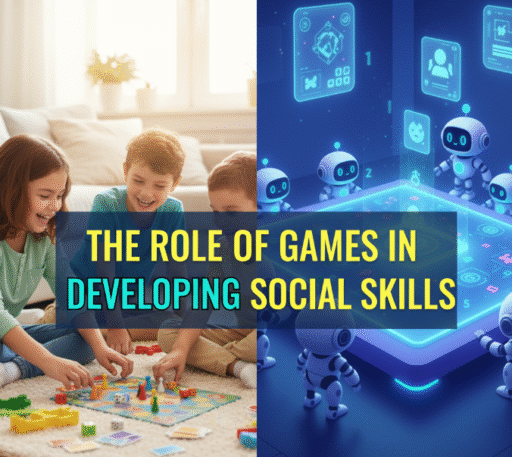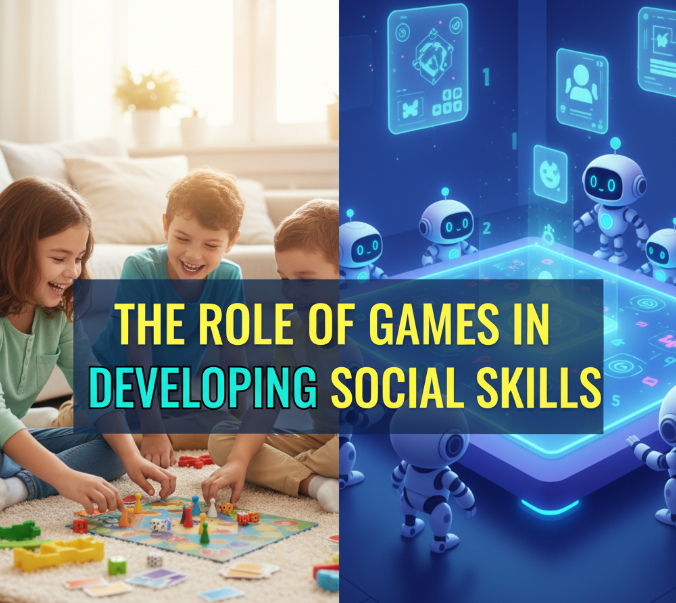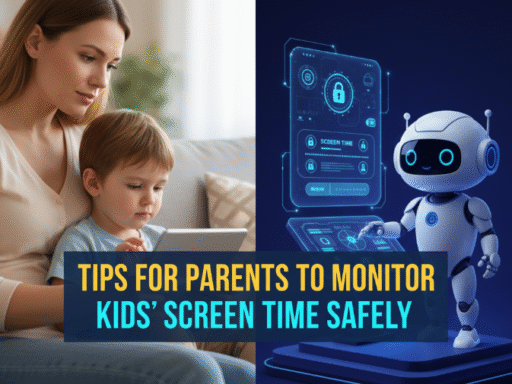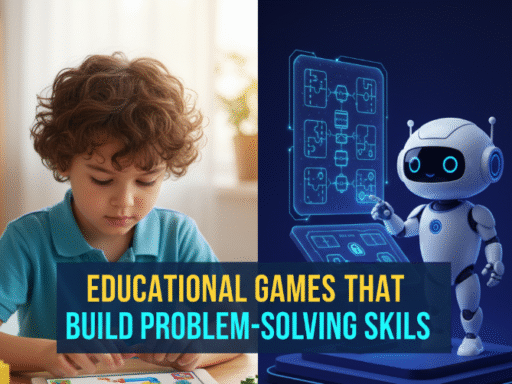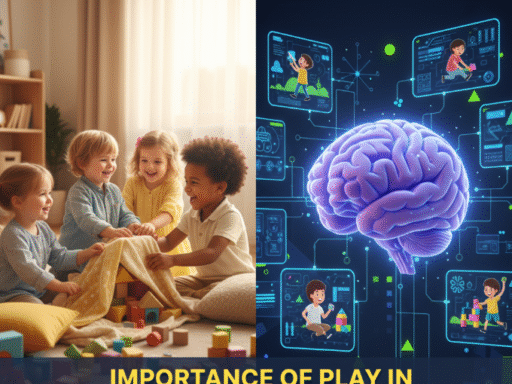Introduction
In today’s fast-paced world, children and even adults are spending more time on screens and less time interacting face-to-face. While technology is often blamed for weakening social connections, games—both digital and traditional—have proven to be powerful tools for building communication, teamwork, empathy, and problem-solving abilities. Social skills don’t just happen naturally; they are learned, practiced, and refined through experiences. Games create those experiences in a fun, engaging, and safe way.
Whether it’s board games played at family gatherings, outdoor sports on school grounds, or online multiplayer games connecting players worldwide, games offer opportunities to interact, cooperate, and understand others. This article explores how games help people develop crucial social skills that benefit them in school, at work, and in everyday life.
Why Social Skills Matter
Before diving into the role of games, it’s important to recognize why social skills are so vital. Social skills are the foundation of healthy relationships and successful communication. They include the ability to:
-
Listen and respond appropriately
-
Work as part of a team
-
Show empathy and understanding
-
Manage conflicts peacefully
-
Build trust and cooperation
People with strong social skills are often more confident, make friends easily, and perform better in collaborative settings such as classrooms or workplaces. On the other hand, weak social skills can lead to misunderstandings, isolation, and difficulties in personal and professional growth.
How Games Act as Social Teachers
Games are more than entertainment—they are mini training grounds for real-life interactions. When people play, they naturally practice communication, negotiation, patience, and cooperation. Unlike lectures or formal lessons, games teach these skills through experience, which makes them stick better.
Key Ways Games Build Social Skills:
-
Encourage Teamwork – Players often need to collaborate toward a shared goal.
-
Promote Communication – Explaining rules, strategies, or moves requires clear talking and listening.
-
Teach Conflict Resolution – Disagreements about rules or strategies teach negotiation and compromise.
-
Develop Leadership – Games often provide opportunities for some players to step up and guide others.
-
Boost Empathy – Understanding others’ feelings during wins and losses helps build compassion.
Types of Games and Their Social Benefits
Not all games teach the same skills. Different categories of games highlight different aspects of social development. Below is a detailed breakdown.
1. Board Games and Card Games
Classic board and card games have been a staple of family and community bonding for decades.
Social Benefits:
-
Turn-taking teaches patience.
-
Rule-following encourages fairness.
-
Negotiation and trading games (like Monopoly) build persuasion skills.
-
Celebrating wins and handling losses teaches emotional balance.
Examples:
-
Chess, Ludo, Monopoly, Uno, Scrabble.
2. Outdoor and Physical Games
Sports and outdoor games involve physical activity along with teamwork.
Social Benefits:
-
Players learn cooperation and trust in team sports.
-
Respecting referees or captains develops discipline.
-
Sharing equipment and space encourages inclusivity.
-
Experiencing both victory and defeat builds resilience.
Examples:
-
Football (soccer), basketball, cricket, tag, relay races.
3. Role-Playing and Imaginative Games
These games let players take on different roles, encouraging creativity and empathy.
Social Benefits:
-
Players understand others’ perspectives by “stepping into their shoes.”
-
Improves storytelling and communication skills.
-
Builds leadership and decision-making abilities.
-
Fosters group bonding and imagination.
Examples:
-
Drama-based classroom games, Dungeons & Dragons, pretend-play for kids.
4. Digital and Online Games
Online multiplayer and cooperative games have gained massive popularity.
Social Benefits:
-
Global interaction exposes players to diverse cultures.
-
Online teamwork fosters leadership and collaboration.
-
Chat functions enhance written communication skills.
-
Learning to manage toxic behavior helps strengthen conflict resolution skills.
Examples:
-
Minecraft, Fortnite, Roblox, Among Us, cooperative role-playing games.
5. Educational Games
Games designed for learning combine fun with skill development.
Social Benefits:
-
Promote collaboration in solving puzzles or answering questions.
-
Encourage problem-solving and critical thinking in groups.
-
Provide equal chances for shy or introverted players to participate.
Examples:
-
Kahoot!, Quizizz, trivia games, classroom escape-room challenges.
Social Skills Strengthened Through Games
Games impact specific areas of social development in a structured yet enjoyable way.
1. Communication Skills
-
Players explain ideas, ask questions, and listen actively.
-
They learn to adapt their communication style depending on teammates.
-
Miscommunication teaches clarity and patience.
2. Teamwork and Cooperation
-
Shared goals foster unity and collective problem-solving.
-
Players discover the value of contributing fairly to group efforts.
3. Conflict Management
-
Disputes over rules, fouls, or game results encourage compromise.
-
Teaches how to stay calm under pressure and handle disagreements politely.
4. Emotional Intelligence
-
Coping with losses develops resilience.
-
Celebrating others’ wins strengthens empathy.
5. Leadership and Responsibility
-
Taking the role of captain or leader nurtures accountability.
-
Players practice motivating others and making fair decisions.
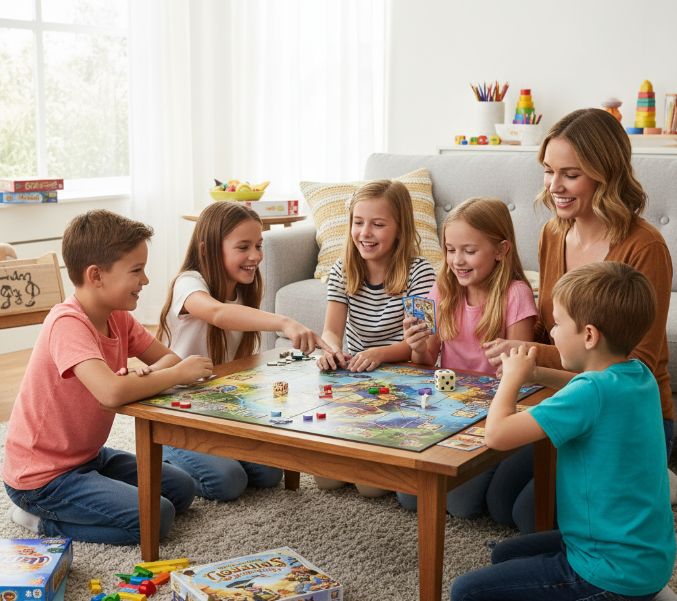
The Role of Games in Developing Social Skills
Table: Games and Their Social Skill Focus
| Game Type | Example Games | Main Social Skills Developed |
|---|---|---|
| Board Games | Monopoly, Scrabble | Negotiation, patience, rule-following |
| Outdoor Sports | Football, Cricket | Teamwork, discipline, trust |
| Role-Playing Games | D&D, Pretend play | Creativity, empathy, leadership |
| Online Multiplayer | Minecraft, Roblox | Global communication, teamwork |
| Educational Games | Kahoot!, Trivia | Problem-solving, collaboration |
The Role of Games in Different Age Groups
Games play different roles depending on age, as social needs evolve throughout life.
Children (Ages 4–12)
-
Learn sharing, turn-taking, and basic cooperation.
-
Pretend-play develops imagination and empathy.
Teenagers (Ages 13–18)
-
Build stronger teamwork through sports and digital games.
-
Gain confidence in leadership and negotiation.
-
Learn to balance competition with friendships.
Adults (18 and above)
-
Use games for stress relief and team bonding.
-
Office team-building activities strengthen workplace relationships.
-
Cooperative online games help maintain social connections.
Real-Life Applications of Social Skills from Games
The lessons learned during gameplay transfer to real-world scenarios:
-
Classroom: Group projects benefit from teamwork and communication skills.
-
Workplace: Employees with strong collaboration skills often excel in team-based jobs.
-
Family Life: Board games and shared play strengthen family ties.
-
Friendships: Games create common ground for bonding and mutual support.
Graph: Skills Gained from Different Game Types
(Graph shows relative emphasis of each skill in different game types.)
Tips for Parents and Teachers
-
Encourage Variety – Introduce kids to both physical and digital games for balanced growth.
-
Set Healthy Boundaries – Limit excessive screen time but allow enough play for social interaction.
-
Join the Fun – Playing alongside kids strengthens family relationships.
-
Use Games as Teaching Moments – Talk about teamwork, fairness, and respect after play sessions.
-
Promote Inclusive Play – Make sure every participant feels valued and included.
Future of Social Skill Development Through Games
With technology advancing, games are becoming even more influential in shaping social skills. Virtual reality, augmented reality, and AI-driven learning games are creating immersive environments for practicing communication, teamwork, and empathy. Schools are also incorporating gamified learning systems to encourage student participation and collaboration.
Conclusion
Games are not just about winning or losing—they are about connecting, sharing, and learning together. From board games at family gatherings to digital multiplayer worlds, games help people build social skills that last a lifetime. They teach communication, teamwork, empathy, leadership, and conflict resolution in ways that feel natural and enjoyable.
In a world where human connections are more important than ever, games provide the perfect training ground for developing the social skills that make us better friends, family members, students, and professionals.
